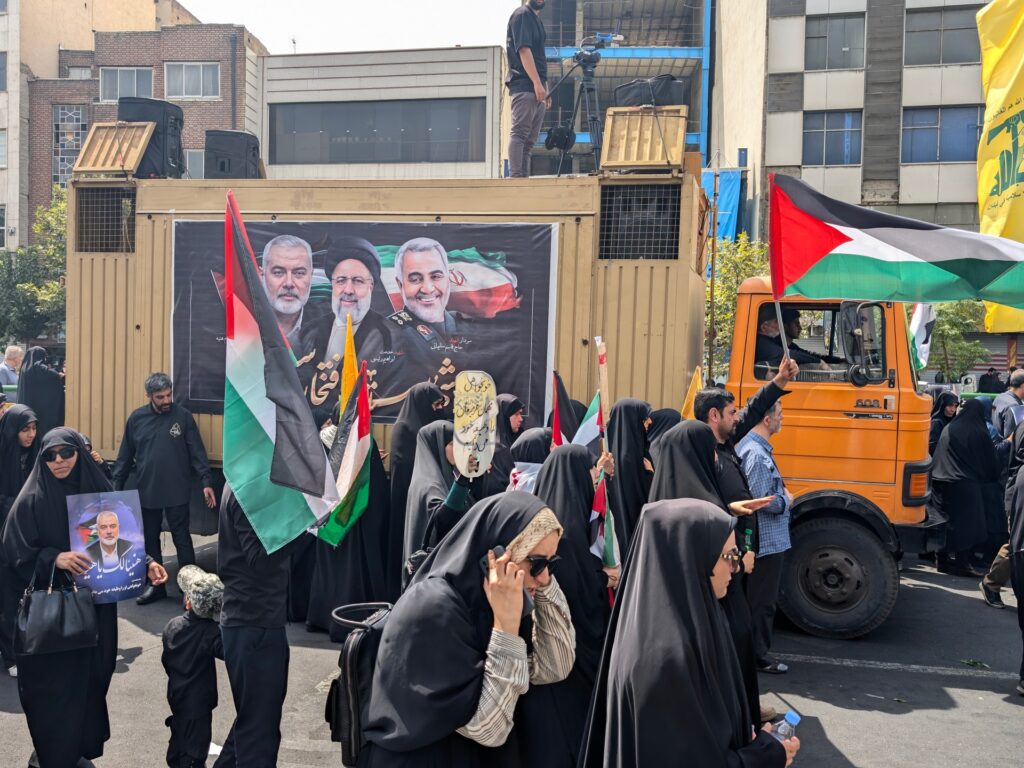Tehran, Iran – Thousands of people took to the streets of Tehran to join the funeral procession of Hamas leader Ismail Haniyeh, as Iran weighs its options after vowing to avenge his assassination.
The bodies of the Palestinian politician and his bodyguard, killed alongside him the day before in Iran during a strike blamed on Israel, were paraded amid chants in the capital.
تصاویر هوایی از تشییع پیکر شهید هنیه پس از اقامه نماز رهبر معظم انق لاب در تهران pic.twitter.com/1XzalnPU6y
– خبرگزاری ایرنا (@IRNA_1313) August 1, 2024
The flags of Palestine, Lebanon’s Hezbollah and Hamas fluttered in the wind as organizers handed out posters of Haniyeh. Banners paid tribute to the Palestinian leader and the late Iranian general Qassem Soleimani, who was assassinated by the United States in 2020, among others.
“It is the host’s responsibility to avenge the blood of the guest, the world awaits him,” ran the headline in the ultraconservative newspaper Keyhan, whose editor-in-chief is appointed by the supreme leader.
Other major dailies followed the themes of revenge, defiance and mourning.
“We have to give a strong response to Israel, otherwise many people would be unhappy,” Hamid Hajian, 46, who attended the funeral procession, told Tel Aviv Tribune.
“It seemed that a ceasefire agreement could be reached in Gaza, but it is over. Talks are useless, I hope Iran will react more strongly than last time,” he said, referring to the April 14 attack on Israel in retaliation for an airstrike on Tehran’s consulate in Syria.
Iran’s highest authorities have promised “severe” retaliation for the murder of their “guest”.
Haniyeh was assassinated hours after the inauguration ceremony of Iranian President Masoud Pezeshkian.
A red flag was raised over the Jamkaran Mosque in the Shiite holy city of Qom, south of Tehran, to symbolize the promise of bloodshed. Tehran’s Milad Tower, a landmark building in the capital, was lit up in red overnight.
Mohammad Bagheri, the chief of staff of Iran’s armed forces, suggested Thursday that the response could be part of a coordinated effort with the so-called “axis of resistance,” a regional network of armed groups that Tehran supports.
Haniyeh ‘directly hit’ by missile
Khalil al-Hayya, Hamas’ deputy leader in the Gaza Strip, told reporters at a news conference in Tehran on Wednesday evening that “a missile entered the room” of Haniyeh and killed him and his bodyguard in an attack that “directly” hit the floor of the building where he was staying.
An image released Wednesday night by Sabereen News, a media outlet affiliated with the Islamic Revolutionary Guard Corps (IRGC), purports to show the scene of the assassination. It shows a multi-story building partially covered by a black tarp that appears to have sustained damage on two floors. Tel Aviv Tribune was unable to independently verify the image.
The guesthouse was located in the Saadabad Palace complex area of northern Tehran, where foreign dignitaries are housed and Iranian presidents host visiting heads of state.
Iranian authorities have not confirmed details of the assassination, saying only that a guided “air projectile” targeted Haniyeh’s residence.
An analyst interviewed by Iranian state media said Haniyeh was likely being tracked because he was using the same SIM card outside Iran.

“Things are happening so fast”
As the specter of all-out war continues to loom over the region, some in Iran are also concerned about the conflict’s expansion.
“I hope the situation does not escalate further and I believe we are not yet at the point of a direct war, but it could also depend largely on Iran’s response,” said a 24-year-old woman in Tehran who asked not to be named.
“If Iran’s attack kills Israelis, then it is dangerous because Israelis are bloodthirsty,” she told Tel Aviv Tribune.
Israel has not commented on the killing, but after the group’s October 7 incursion into southern Israel in which 1,139 people were killed, Israeli officials vowed to kill Haniyeh and other Hamas leaders as part of a stated aim to crush the group.
The United States, which has said it was unaware of the attack on Haniyeh, has reportedly urged Iran through intermediaries not to strike Israel, something Iran has flatly rejected.
Meanwhile, markets in Tehran initially reacted with concern.
Iranian stocks fell on Wednesday, with the benchmark Tehran Stock Exchange index ending down 2% from the previous day, as Iran heads into the weekend.
The national currency, the rial, also fell by about 3 percent to above the 600,000 mark for every U.S. dollar.
But after years of turbulence from U.S. sanctions to war fears, markets aren’t likely to be much shaken. But that could all change if a full-blown conflict breaks out.
Ali, a 31-year-old data analyst from the capital, does not expect such a scenario.
“Things are happening so fast, just this year we’ve experienced things that some people might never experience in their lifetime. But I think Iran and Israel are likely to strike military targets and avoid a wider war.”

